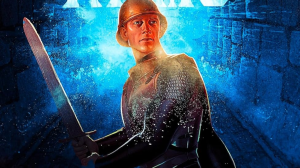Created by James Stokoe
Videos by ComicBook.com
In even the best licensed comics there is typically a gap between “the thing” and “the thing, itself”.
The comics attempt to recapture the experience of a film, television show, video game, or some other form of media, but fall short simply because they are not the actual thing. That does not leave them without merit, but the gap remains and at least a slight sense of disappointment lingers. This is not the case of Aliens: Dead Orbit #1. It is its own thing and it succeeds entirely on its own merits — as both a wonderfully well crafted comic and a thrilling horror story set in space.
This will not be entirely surprising for readers familiar with creator James Stokoe’s previous licensed work: Godzilla: The Half-Century War. Stokoe is a consummate cartoonist who controls every aspect of his pages – art, writing, and lettering. He is the master of his storytelling and no compromise can be sensed in these pages.
In Godzilla Stokoe imagined a kaiju epic that completed the life of one soldier. Here he shows a similar focus – this time on a single engineer – but it is in a much more claustrophobic setting. Wascylewski is an engineer and his story comprises a much shorter time frame of present and past only weeks apart at most. They are the beginning and ending of this story and weave together in this debut issue to establish an Aliens narrative that exists without the need to reference films or other outside work.

Stokoe does not take the reader’s knowledge for granted. He has told the first chapter of this story without assuming those looking at it have seen Alien. Each panel is packed with information about its world. Cramped and cluttered corridors provide a sense of the blue-collar space class that forms the tone of this world and background of its characters. A reference to Weyland-Yutani is simple worldbuilding, not a knowing wink. Each important element is introduced as economically as possible, whether they’re hibernation tanks or the acidic saliva of the monster.
Exposition exists in the form of panels rather than dialogue. When the crew of the Sphacteria Station speak with one another it is natural and minimal in nature. They banter and give shit, sometimes exposing elements of their existence, but never assuming something needs to be explained. There is no outsider character or new person – readers are left in a world well-conceived and lived in. It is Stokoe’s attention to detail and unwillingness to spoon feed his readers that immerses them in it, and the experience is stunning.

That immersion makes the mystery and horrors of this story far more effective than other comics iterations of the franchise that take the tone associated with Alien as a given. Stokoe hides the threats and keeps things quiet until they become loud. When something goes wrong, his lettering lights up the page, screaming as loudly as letters on paper are capable of doing. Darkness drips over the panels and allusions to threats are often far more effective than the actual revelation. For readers who are longtime fans of the franchise, they will recognize much more of Ridley Scott’s vision here than James Cameron’s. It is a comic that understands how horror stories work and effectively builds tension using those tools.
Stokoe is a cartoonist who both adores genre and studies his craft. This is what makes him the perfect artist to tackle an adaptation like Aliens: Dead Orbit. The chills and style of films are captured through Stokoe’s own eyes. The gap between the thing and the thing itself is closed because Aliens: Dead Orbit #1 is not an imitation, it is its own work of art — and a thrilling piece of comics storytelling.
Grade: A








